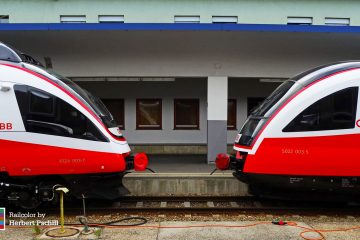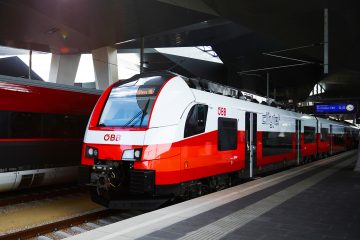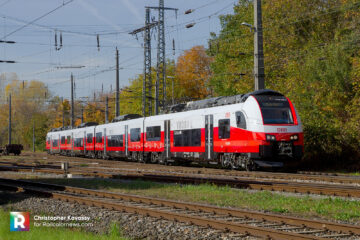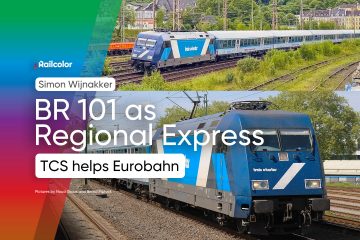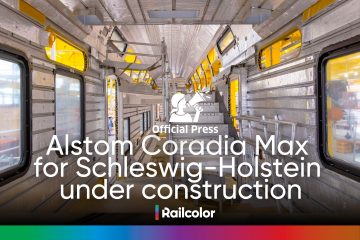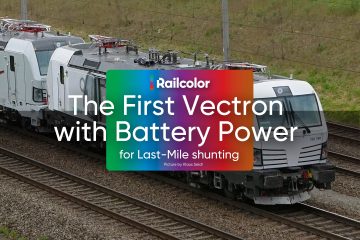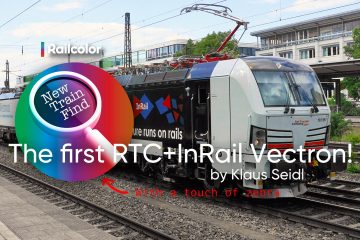The Austrian Federal Railways (ÖBB) and Siemens Mobility are jointly investing in the future of passenger transport and are developing an electro-hybrid battery drive for trains. Today, both companies presented in Vienna the first result of this innovative pilot project, the prototype of the Desiro ML Cityjet eco.
Operating as a battery-powered train, the Cityjet eco is an alternative for non-electrified rail lines primarily served at present with diesel-powered passenger trains. Battery operation can reduce CO2emissions by up to 50 percent compared to diesels. Following extensive testing of the train, it is expected to first be used in passenger service in the second half of 2019. The prototype will be presented on track 1/400 in the outdoor exhibition area at the InnoTrans 2018, the leading international trade fair for transport technology, being held in Berlin on September 18-21.
[..] Siemens is developing an electro-hybrid battery drive that enables the train to charge its newly installed batteries via the pantograph on electrified rail lines. This energy is then available for powering the train on non-electrified stretches. As soon as the train leaves the electrified line, its batteries feed the train’s power supply system. Siemens and ÖBB will now thoroughly test this technology in a pilot project over the coming months and develop the system to series maturity.A pilot project
In the joint project with Siemens, ÖBB is one of the first European railways to secure valuable know-how in this field and thus be able to further expand the quality of its services for passengers as well as the sustainability of its fleet. The pilot project will be conducted with a train taken from the series of Siemens Desiro ML trains currently being produced for ÖBB. The train’s design enables it to accommodate additional roof loads. As a result, the usual industry-wide production and delivery time of up to 36 months for a new train can be reduced to less than half.

The battery system located on the middle car of the converted trainset is comprised of three battery containers, two DC/DC controllers, a battery cooler and other electronic components. The system uses lithium-titanate batteries (LTO technology). Compared with conventional lithium-ion batteries, these modified batteries allow significantly higher charging currents for fast charging. Thanks to a special thermal concept for the battery containers, it’s expected that external weather conditions will have no influence on battery life and their charge status. When the batteries are ready for series production, they should have a lifetime of around 15 years, which means they will have to be replaced only once over the entire service life of the train.
Technical parameters
- Wheel arrangement Bo‘Bo‘+2‘2‘+Bo‘Bo‘
- Length 75,152 mm
- Maximum speed 140 km/h (AC) and 120 km/h (battery)
- Traction power up to 2,600 kW
- Installed battery capacity 528 kWh
- Starting acceleration 1.0 m/s2 (AC) and 0.77 m/s2 (battery)
- Floor height 600 mm
- Capacity 244 seats on urban train
- Axle load < 17 t including traction battery pack
- Crashworthiness TSI and EN 15227 conform
- Fire protection CEN / TS 45545 and DIN 5510 Fire protection level 2
Desiro ML: sufficient space and weight reserves
The Cityjet Eco project is part of the “Update Fleet Strategy 2035” program initiated by ÖBB Holding AG, the battery-powered Cityjet subproject will be implemented in Subpackage 2, “Alternative Drive Systems.”
The goal of this project is to gain experience in operating alternative drive types under all operating conditions (summer/winter operation). For this purpose, a series-production train set from current production has been converted and will soon be tested in regular operation.
The existing Desiro ML design (AC electric only) had sufficient space and weight reserves to install the batteries. By taking a EMU from the current production line the delivery/production time of the BEMU was cut by more than half.
In social media:
Was stellen wir da heute vor? Den Cityjet eco! Nicht elektrifizierte Bahnstrecken auch mit Cityjets befahren – das ist mit diesem Pilotprojekt möglich. Das heißt auch: Weniger Diesel, mehr Strom ? pic.twitter.com/vZGuWXKizz
— ÖBB (@unsereOEBB) September 10, 2018


